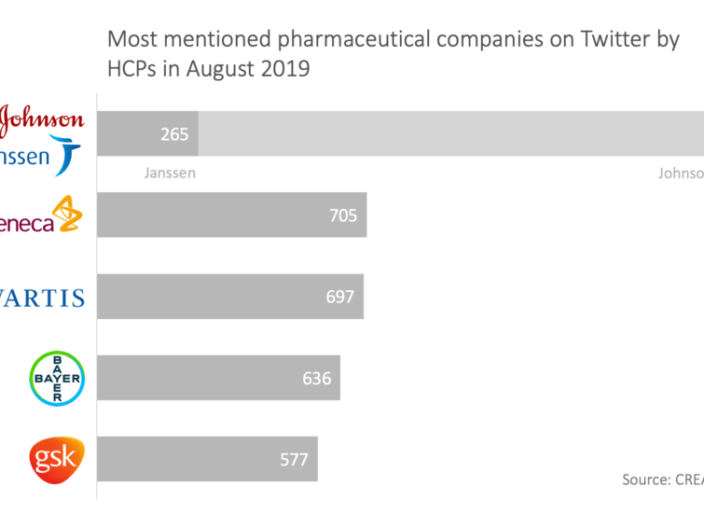On 09 December 2022, the World Health Organisation (WHO) released The WHO AWaRe (Access, Watch, Reserve) antibiotic book, which ‘provides concise, evidence-based guidance on the choice of antibiotic, dose, route of administration, and duration of treatment for more than 30 of the most common clinical infections in children and adults in both primary health care and hospital settings’.
CREATION.co tracked the conversation of healthcare professionals on social media relating to antimicrobial resistance (AMR) between November 2022 and July 2023, analysing nearly 18,000 posts by over 5,000 online healthcare professionals (eHCPs) to discover the impact of The WHO AWaRe book.
Antimicrobial resistance is a global healthcare burden recognised by many health stakeholders, and as such the publication of this antibiotic book could be significant for healthcare workers in being able to uphold an effective level of antimicrobial stewardship.
The response to the book among eHCPs was limited, particularly in comparison with the overall AMR conversation. Under 100 eHCPs used their social accounts to share the book with their audiences in the week it was published, which was about an eighth of the overall AMR conversation in that week.
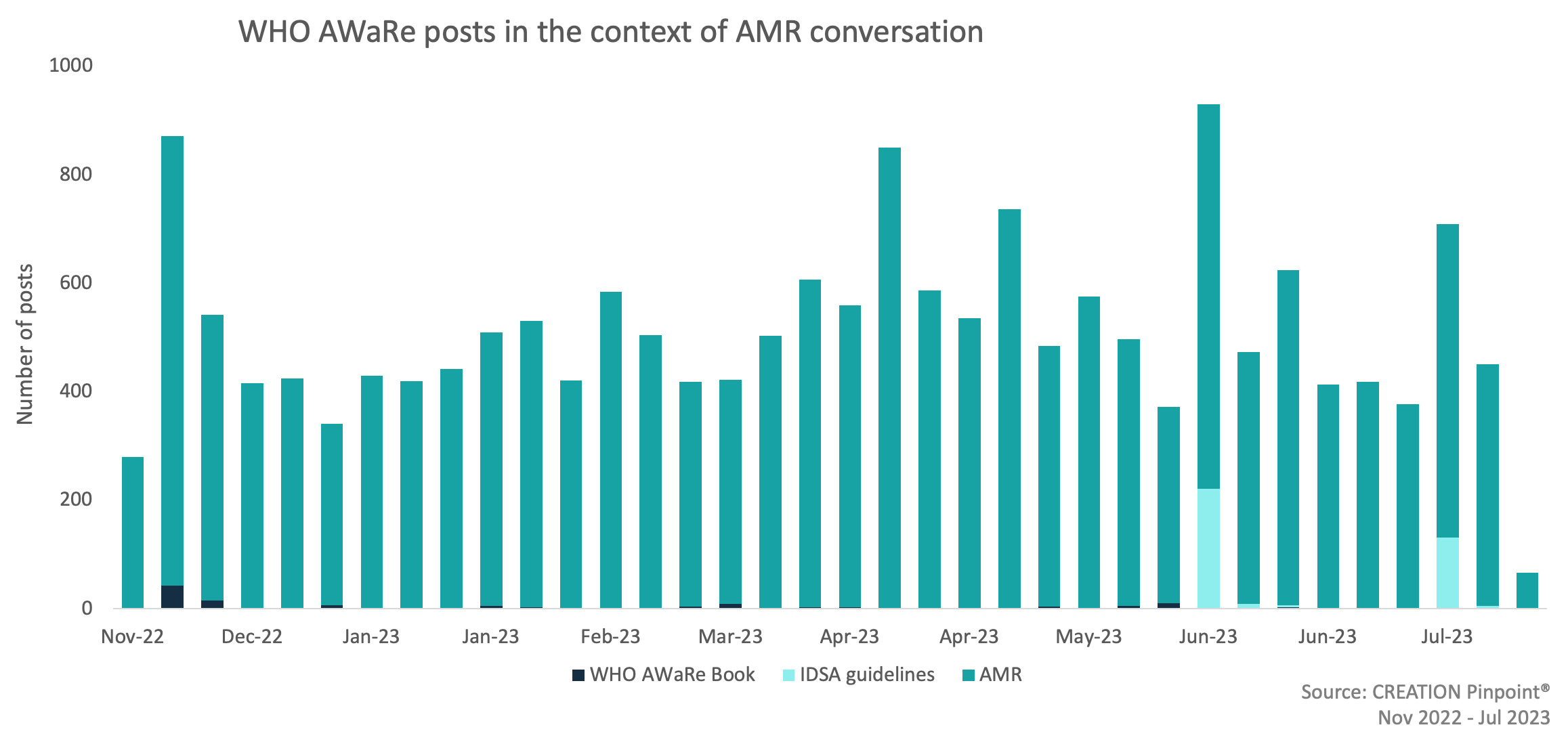
On 18 July 2023, the Infectious Diseases Society of America (IDSA) published 2023 Guidance on the Treatment of Antimicrobial Resistant Gram-Negative Infections.
In the week of the publication of the IDSA guidance 219 eHCPs shared it on their social profiles. This shows there is appetite among eHCP for guidelines and recommendations in AMR and they are willing to amplify these. It also further suggests the response to The WHO AWaRe book has, as of yet, been lower than expected.
Despite a lower number of social media mentions, it was apparent that HCPs were sharing the book in belief of its usefulness in addressing antimicrobial resistance and helping prescribers combat the issue through appropriate prescribing methods.
Christopher Lee, an infectious disease physician from Malaysia, advocated for its usefulness to his followers, and the UK Special Envoy on Antimicrobial resistance.
Dame Sally Davies congratulated the WHO on the publication of the book and stated that it ‘gives us a global way forward for prescribing and promoting the appropriate use of antibiotics’.
The WHO AWaRe (Access, Watch, Reserve) antibiotic book.
Covers common community infections. To address Antimicrobial Resistance, we all have to use antimicrobials judiciously.
Useful guide for all primary care practitioners.
Download please. #AMR
https://t.co/fSIbDFYAOT— Christopher Lee (@chriskc_Lee) December 10, 2022
Today's publication of the WHO AWaRe (Access, Watch, Reserve) antibiotic book gives us a global way forward for prescribing and promoting the appropriate use of antibiotics.
Very many congratulations @WHO @sgulamr 💊https://t.co/wbG5pS2u0b
— Prof. Dame Sally Davies (@UKAMREnvoy) December 9, 2022
Following the initial publication, mentions over the next seven months remained fairly low, until a small spike in conversation in June 2023 as eHCPs reposted a Dame Sally Davies’ X (formerly Tweet) publicising a global webinar being hosted on 12 June with the aim to showcase the book.
The @WHO #AWaRe Book will be showcased at a global webinar on 12th June.
Join world-leading scientists, academics and advocates to hear about the importance of antibiotic prescribing to tackle AMR.
Sign up now: https://t.co/HR4dZewsnk pic.twitter.com/mFXx3LMAJ4
— Prof. Dame Sally Davies (@UKAMREnvoy) May 31, 2023
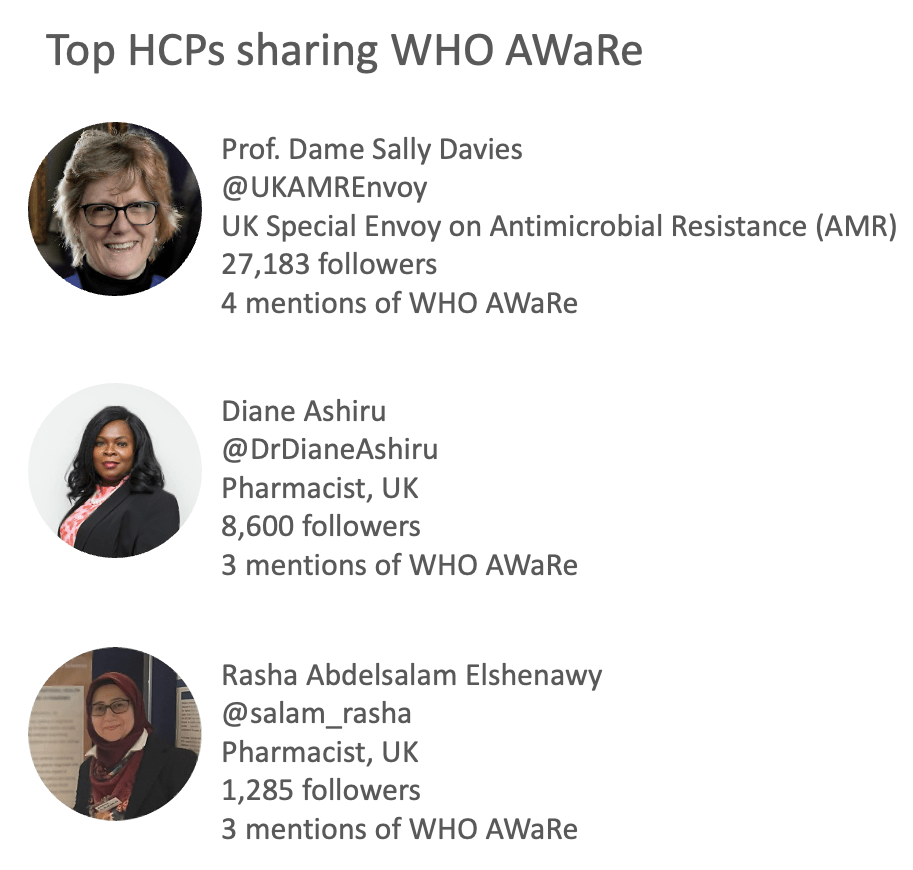
Whilst some key HCP influencers shared posts about WHO AWaRe such as Dame Sally Davies and pharmacist Diane Ashiru, the number of posts by each HCP were limited, with the highest number of posts by one HCP author sharing the book being a mere four posts. That being said, the posts by these key voices drove a high amount of engagement, with Dame Sally Davies’ posts alone being shared over 60 times in total. The top three most frequent posting eHCPs of the AWaRe book were all from the UK.
HCP influencers who didn’t post about WHO AWaRe
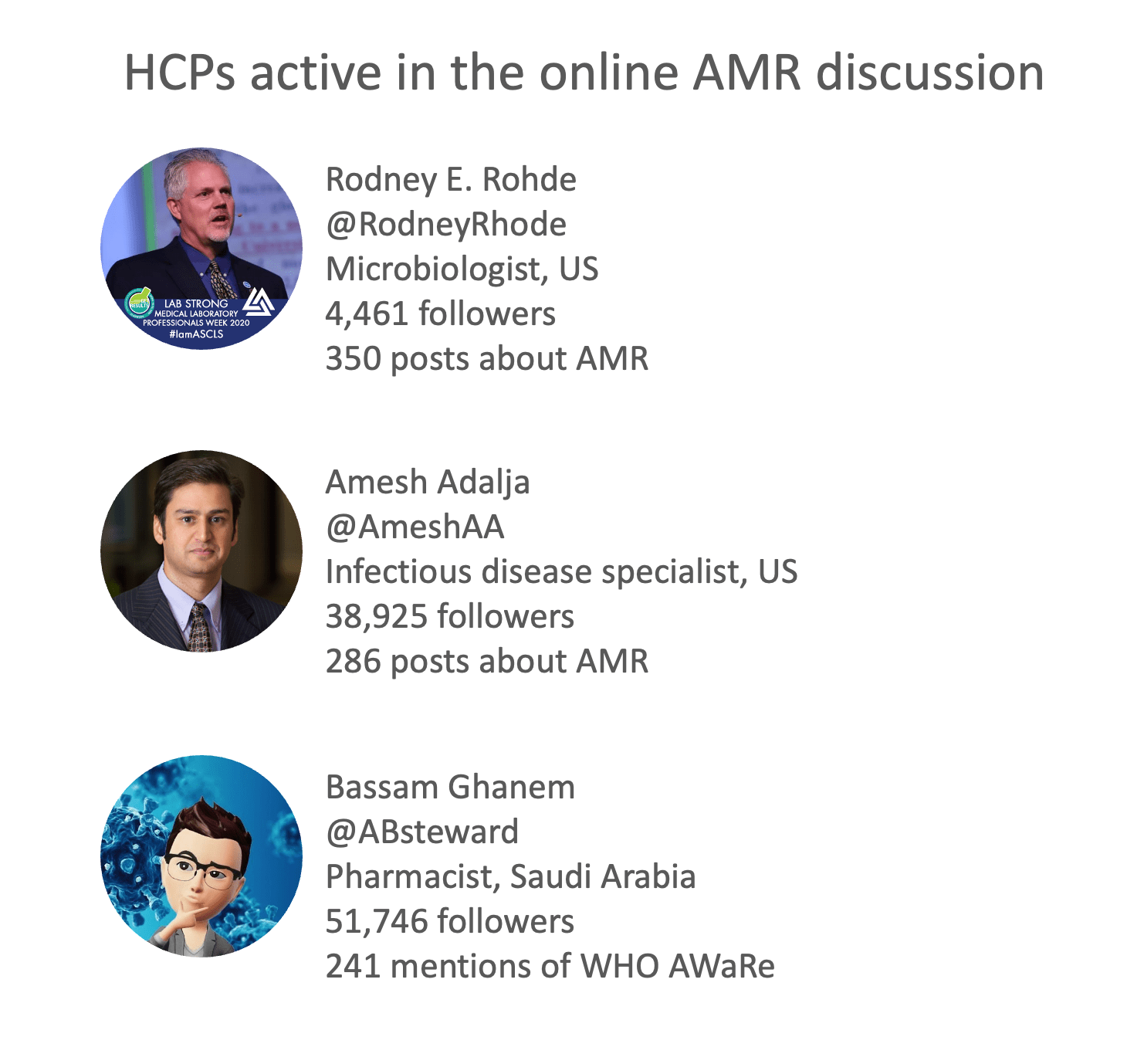
In the wider AMR conversation vocal healthcare professionals are active in seeking to combat AMR on social media channels. Among the eHCPs discussing AMR without sharing the WHO AWaRe antibiotic book, there was a large geographic diversity represented. The top three most actively posting eHCPs in the online AMR conversation were from the US and Saudi Arabia, rather than the UK.
The most active eHCP was Rodney Rohde, a microbiologist from the US, averaging 12 posts a week about AMR. Most of his posts were awareness raising on the dangers of AMR, encouraging his followers to do their part in the fight against it, and sharing webinars and other learning opportunities about solving the issue of AMR.
What are YOU doing to raise awareness & visibility of the global #AMR #antimicrobialresistance issue? It's the SLOW BURNING #pandemic that often goes unnoticed! #theAMRnarrative @theAMRnarrative @CIDRAP @_FaceSA Our article @PreventionTips
Learn more: https://t.co/xE2IOjWLxP
— Rodney E. Rohde, PhD "Doc R" (@RodneyRohde) April 11, 2023
Don't forget to join us, tomorrow on Tuesday, April 11 at 10AM CST. #antimicrobialresistance #AMR #OneHealth #SquashSuperbugsNow @ThePFID @ASCP_Chicago @ASCLS @patient @GilbertSwink @IDstewardship @WeFightAMR @gardp_amr @AmrInsights @andreaprinzi @nmoore07 @PreventionTips 👇💥👇 https://t.co/YPu09jmG2a
— Rodney E. Rohde, PhD "Doc R" (@RodneyRohde) April 10, 2023
Bassam Ghanem, a pharmacist from Saudi Arabia, averaged eight posts a week discussing AMR, shared research articles including the WHO’s ‘Global research agenda for antimicrobial resistance in human health’. He frequently mentioned other key HCPs in his posts, creating a community of HCPs disseminating awareness and research around AMR. His posts received a high amount of engagement, with a number of them being shared more than 100 times.
🔥WHO published its 1st global research agenda for the world’s scientists to address the most urgent human health priorities to combat antimicrobial resistance
It outlines 40 research topics on drug-resistant bacteria,fungi& Mycobacterium TB
H/t @paimadhuhttps://t.co/AOVObnJK5Q pic.twitter.com/owZJwMIDXK— Antibiotic Steward Bassam Ghanem 🅱️C🆔🅿️🌟 (@ABsteward) June 22, 2023
🔥NEW🔥 @PharmacoJournal@LinaMengPharmD @DHpharmd@EmilyMui @StanDeresinski @StanfordASP
Comprehensive Guidance for Antibiotic Dosing in Obese Adults: 2022 Update #IDTwitter
cc @SIDPharm @accpinfdprn @IDstewardship @InfectiousDz @DosingMatters #paywall☹️https://t.co/otqUjYoMn5— Antibiotic Steward Bassam Ghanem 🅱️C🆔🅿️🌟 (@ABsteward) January 27, 2023
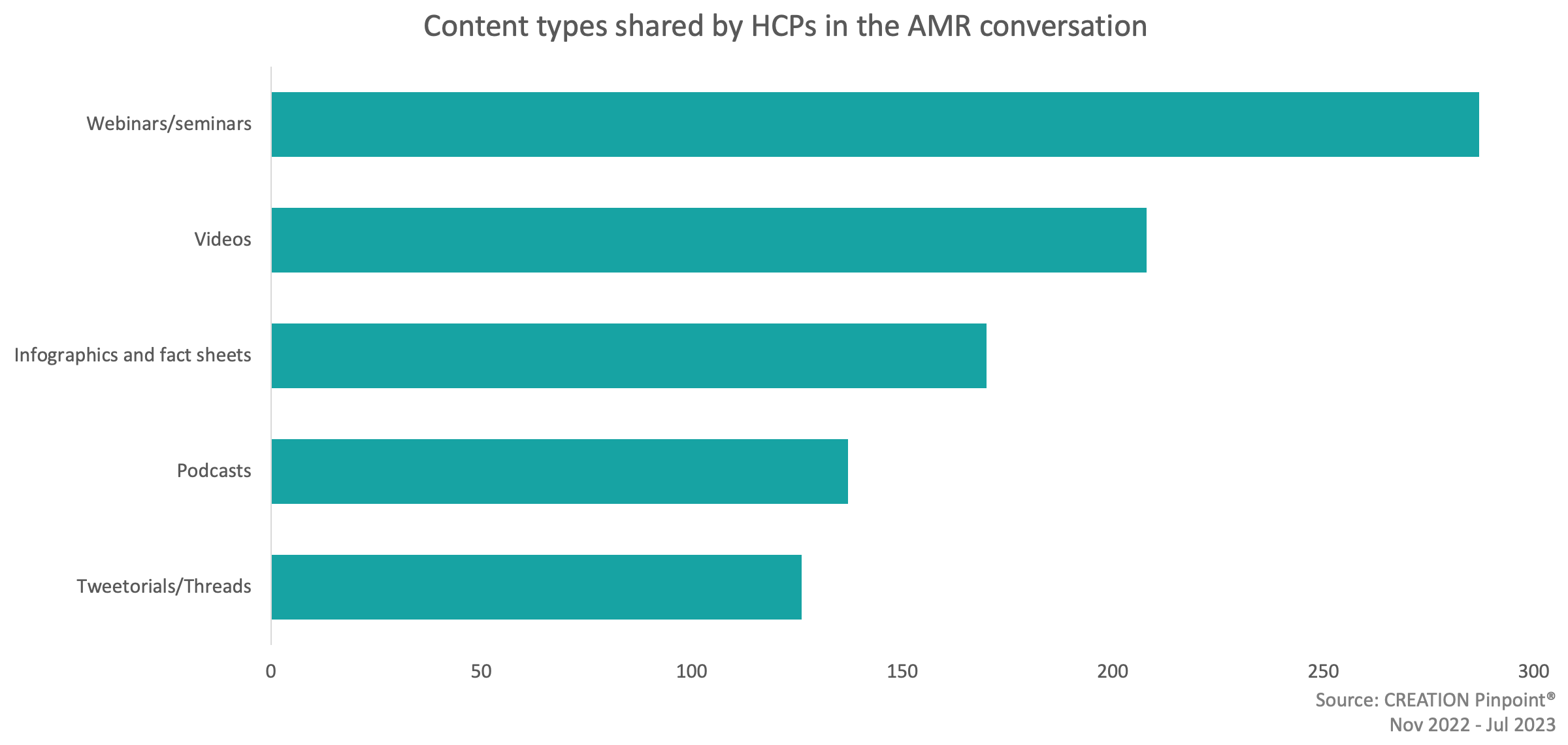
Considering the level of activity from active HCPs online and the number of other eHCPs engaging with their posts, there could be an opportunity for The WHO AWaRe book to be disseminated further to a wider, global HCP audience through these influential online HCPs’ channels. If they, and others like them, were to share the book on their platforms, they would reach prescribers and key stakeholders with important guidance needed to act on antimicrobial resistance and uphold antimicrobial stewardship. In addition, within the online AMR conversation, HCPs keenly shared different sources of information, most notably webinars and seminars, although other forms of information such as videos, podcasts and Tweetorials were also widely shared. Collaboration with key HCPs to disseminate information about AMR via these channels could be very beneficial.
With years of experience and expertise in profiling and helping to partner with HCP Digital Opinion Leaders (DOLs), CREATION.co has seen the immensely positive impact of the right DOLs sharing important information to their peers online. These DOLs are often keen to share information that serves public health and patients, which WHO AWaRe encompasses, and as such, leveraging these active HCPs in the AMR conversation would be incredibly beneficial to WHO in getting their message across.
To find out more about HCPs’ views in AMR or how you could partner with Digital Opinion Leaders, please reach out to us, we’d love to connect.
 By Francesca Gan
By Francesca Gan 
